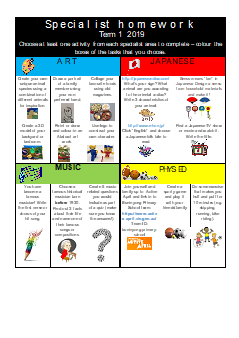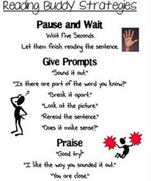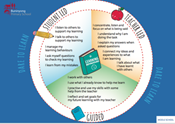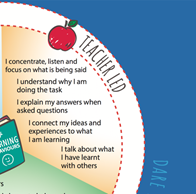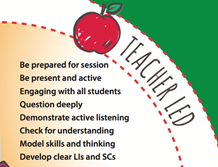Teaching & Learning

Homework
You will have seen that this week’s homework is all about how we can foster our artistic, language and health needs through participating in a range of activities as set by the Specialist teachers. The task is for students to choose at least 1 task from each specialist area to take part in during the week. Students can highlight the completed tasks and parents can sign to show they have been a part of it.
The idea behind the homework grid is to acknowledge the importance that everyday tasks play in our development of language, creativity, health and fitness to create a well balanced life.
This initiative will be repeated in Week 5 of every term.
So how do I best support my child to read regularly at home?
Reading is the one non-negotiable of our homework policy. It doesn't matter if the homework comes from the classroom or the specialist teachers, reading at home for at least 15 minutes per night will assist greatly to develop great reading habits.
A common question that is asked is how to make this a ritual at home…. The simple answer is to have fun with the process, keep your parent hat on and model great reading habits. The first role of parents is not to teach your child to read, but to promote the love of learning by modelling and encouraging curiosity. (unfortunately in this day and age, this can be a lot more difficult than it seems)
Here is a process you could adopt:
1. Find a comfy place free from screens and other distractions.
2. Walk through the book: look at the front cover, ask questions about the pictures and predict what might happen. Turn the pages, not reading the text but pointing out key parts to each page. It could be a word, diagram, heading or picture. Your child will start putting together the story in their heads.
3. Read the book together…. Have fun and don't put pressure on your child to get words correct. Use a pause, prompt, praise approach.
a. Pause – see if your child can solve the word.
b. Prompt – give a clue. It could be the start, middle or end sound or even what makes sense in the sentence.
c. Praise - when your child has had a plausible attempt. Simply correct and move on. Remember your role is to promote curiosity and the love of learning, not to get into an argument about missing the first sound in the word.
4. At the end of the book or at specific places throughout the book pause to ask a question or two. Use a combination of Who, What, When, Where and Why questions. You may even like to connect an event from the story to real life ie. remember when… this reminds me of…
Fundraising Team
Over the past few years the interest in raising funds to support school programs and in social justice opportunities has increased dramatically, which is great. We understand that this has also inadvertently put pressure on our community to constantly be contributing to these efforts. Although these are great values to instil in our students, we also acknowledge the need to spread these efforts across the year.
This year we have been working to establish a Fundraising team made up of staff, parents and students. The purpose of this team is not to raise money, but rather to coordinate any fundraising efforts across the school. In doing so, the team will aim to:
- Spread fundraising efforts across a given year and ensure fundraising demands on parents are reasonable.
- Ensure fundraising approaches and targets are appropriate and match the values of the school.
- Ensure the various school programs are accommodated.
- Extend fundraising efforts to charities / causes beyond the school to build a deeper understanding of social justice.
In order to enable this team to work effectively, we are asking all fundraising ideas to be submitted on an event form for approval. The event forms can be obtained from the office in hard copy or by email on the school address.
Curriculum Day – Thursday 5th March
Next Thursday is a curriculum day across both campuses at Buninyong PS. These curriculum days are important to our school, as they allow all staff to work and learn together for a significant period of time.
On this occasion the staff will be working with education consultant Andrea Hillbrick to develop effective strategies to help build on our Writing model.
We look forward to sharing our learning with you all following the day. It is a timely reminder to organise alternative arrangements for your children on this day.
Focus on Learning Behaviours – Teacher Led
One part of our learning process is when the teacher leads the learning task. This is when the teacher controls the pace at which learning occurs and often includes modelling and explicit questioning.
It is important for students to know that during this time they must learn to:
- Concentrate, listen and focus on what is being said and done.
- Understand why they are doing the task.
- Explain answers to questions.
- Connect ideas to experiences.
- Talk about what has been learnt.
During this time the teacher will be:
- Developing clear Learning Intentions and Success Criteria.
- Prepared and well planned.
- Present and active in their approach to teaching.
- Engaging with all students.
- Questioning deeply.
- Demonstrating active listening.
- Checking for student understanding at various times.
- Modelling the required skills and thinking.

